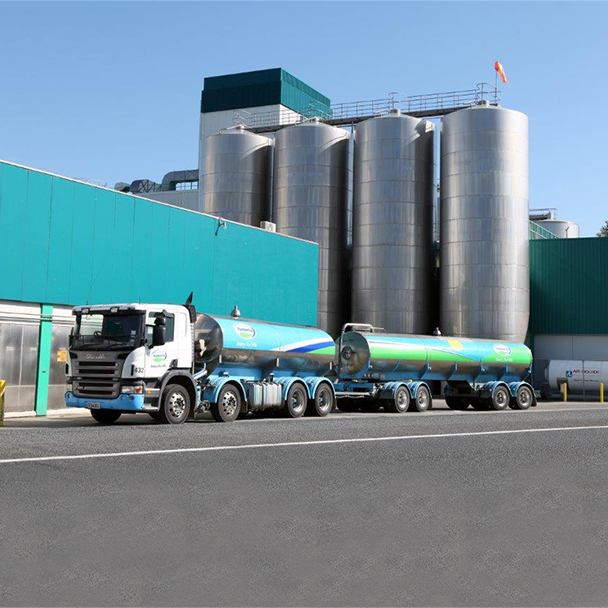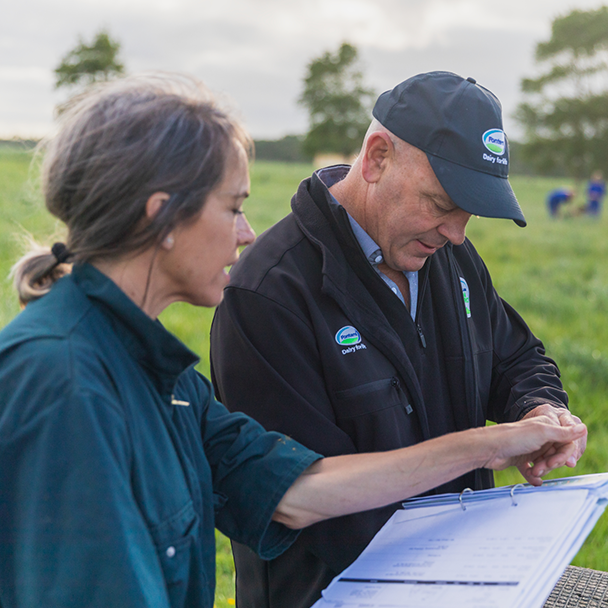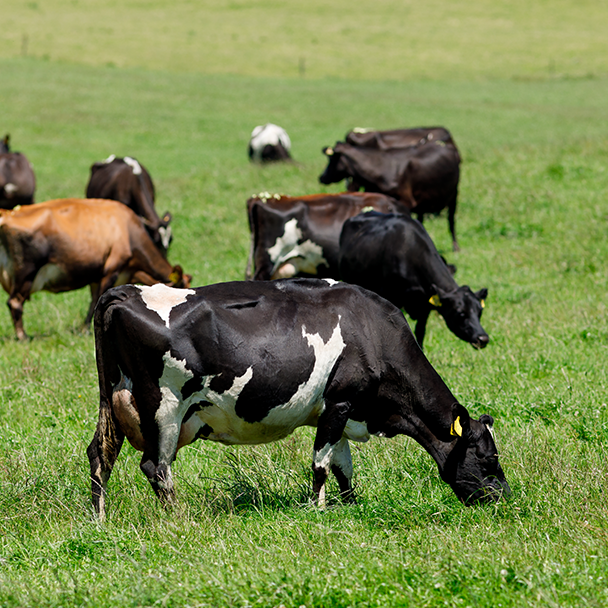Fonterra’s Organic Programme started in 2002 with a small passionate group of farmers. It is now made up of 100+ farms, together supplying over 10 million kg milk solids annually. With demand for our grass-fed New Zealand organic milk currently out stripping supply we are looking for more farmers to join the family, so why choose Fonterra Organic?
YOUR OPPORTUNITY
Are you our next organic farmer?
“It wasn’t only our belief in organic. It actually had to be financially viable, a business decision.”
- Mark Spooner

Stability through scale
We are New Zealand’s leading supplier of organic milk, with the strength of our organic programme coming from your premium grass-fed organic milk combined with the strength of the wider Co-op. The Co-op’s extensive manufacturing footprint and global reach enables us to deliver a competitive and trusted organic portfolio into a wide range of markets.

Supporting your organic journey
The decision to convert to organics is one that can take time and careful consideration. Our team and the wider organic community is here to support you discover this opportunity and what it could mean for your business.

Maximising your return
The organic programme has its own independent farmgate milk price driven by the market value of our organic products. Historically this has returned a $2.05 premium above conventional milk price*.
* since 2016/17 season to the finalised milk price for the 2023/24 season
CONVERTING TO ORGANICS
How can your Co-op support your journey
Fonterra has made a commitment to the Co-op’s organic programme ensuring there is both financial support and access to specialist advice during a farmer’s 3 year transition to Fonterra Organic Certification.
Financial commitment includes a conversion incentive which is paid in addition to the farmgate milk price.
Our team will work alongside you as you navigate your conversion journey, connecting you to the expertise of our wider organic community.
There’s no better place to start than other farmers who have been on this path before. Farmers already in the programme are only too willing to discuss the challenges they have overcome, their learnings and what has worked for them.
We also draw on our strong relationship with certifying bodies, industry experts and consultants who are passionate about seeing the organic industry grow and succeed.
“The support from Fonterra is incredible. We’ve had a lot of help through the organic program. It’s actually been great and they’ve taught us a lot.”
- Stephanie Maunsell
FAQs
Find out more
Organics is also referred to as biological, ecological or regenerative farming. An organic farming system is one that aims to work with natural biological cycles. Organic management recognises that, in any system, every element affects every other element and no one component can be changed or taken out of the system without affecting other components.
Organic management has a particular focus on optimal soil health and management. The soil is regarded as a living system on the basis that there is an essential link between creating healthy soils and healthy plants, animals and people. Fundamentally, organic management requires farmers to act proactively rather than reactively.
Organic management is based on a management system which aims to reduce or eliminate the need for most agricultural chemicals. Organic food is produced without the routine use of synthetic chemicals such as fungicides, herbicides, insecticides, growth regulators and soluble fertilisers.
But it is much more than “spray-free” or “residue-free”.
Organic farmers concentrate primarily on adjustments within the farm and farming system, in particular rotations using appropriate soil fertility management and cultivations, to achieve targeted production levels amd minimise the use of external inputs.
Key principles of organic farming are:
- Encouraging and enhancing biological cycles
- Maintaining and improving long-term soil structure and fertility
- Practising humane management of livestock
- Maintaining the genetic diversity of the agriculture system and its surroundings
- Cycling organic matter and nutrients within a production system
- Integrating management of soil, crop, and the environment for weed, pest and disease management
- Aiming to produce food of high nutritional quality in sufficient quantities
- Minimising all forms of pollution that may result from agricultural techniques
- Not allowing genetic engineering.
There are quite a few misconceptions about the principles of organic farming. Some of the more common misconceptions are discussed below.
- “Organic farming is farming without chemicals.”
All material, living or dead, is composed of chemical compounds. Although organic farming does seek to avoid the direct and/or routine use of synthetic chemicals, naturally-derived chemicals are frequently used in fertilising, plant protection and livestock husbandry. - “Organic farming merely involves substituting 'organic' inputs for so-called 'agro-chemical' ones.”
One of the founding principles of organic farming is working with natural cycles rather than trying to alter them by using external inputs. Although you could replace a number of non-organic elements with organic ones, the best farms work to improve their systems rather than use straight substitution of elements. - “Organic farmers don’t apply any fertiliser or manage weeds.”
While working with the natural processes, an organic farmer still needs to replace the nutrients that are lost with the removal of production of the farm. There are now a range of mainstream companies that offer organic certified products to farmers that provide the farm with essential elements.
Organic farmers are still required to manage the weeds on their farms to maintain farm production. This control includes more manual rather than chemical control of weeds. - “Organic farming means that production will drop by 20% plus.”
An organic system can be as productive as a conventional system, depending on the goal of the farmer. Any potential drop in production would depend on the farming system that is run prior to converting to organics and the production system that the farmer wants to run as their organic system. - “Organic farmers can’t look after their stock.”
An organic livestock farming system needs to have healthy stock to make a profitable farm. Therefore the animals need to be well looked after and treated well. The animals can be treated with certified organic inputs and a lot more work on disease prevention is carried out. However if an animal does not respond to organic treatment, then the farmer must use other methods of treating the animal. If this means that if a vet and conventional treatments are used, the animal is dealt with according to the certification level of the farm.
There are a number of products that have been approved for use in organic farming systems that can be used to treat animals. However in any farming system, the best cure is prevention, and this is the approach that organic farmers embrace.
All New Zealand livestock farmers must adhere to the Animal Welfare Act and treat animals accordingly. - “Organic farming is a return to farming as it was pre-1940’s.”
Farming practises and knowledge has greatly evolved since the early 1900’s and organic farming – like conventional farming – is making use of advances in our understanding of such things as mycorrhizal associations, rhizobia and the rhizosphere, the turnover of organic matter and other areas of soil life, crop and animal husbandry that modern science has revealed. Far from being a return to the past, organic farming is an agriculture system for the future. - “Organic farming requires a change of lifestyle on the part of the farmer.”
In recent years, organic farming methods have been adopted by a wide variety of farmers for a variety of reasons, including economic and social as well as environmental motives. Organic farming is certainly not the preserve of radical environmentalists. - “Organic farmers have higher on-farm costs.”
While some cost may increase under an organic production system, others will reduce. On average, costs like labour, brought in feed (per kg of dry matter) and fertiliser (per kg of nutrient) may increase, whilst other expenditure, such as vet bills and animal health costs, tend to decrease. On average, a well-run organic farm will see a drop in on-farm operational costs over time.
We can support you on your journey to becoming a certified organic farmer by working alongside you and your chosen certification body. Initially you will register with one of the two organic certification bodies in New Zealand that work with our farmers: AsureQuality or BioGro. Your certification body will guide and support you on your whole conversion and certification journey through annual audits, online tools and technical services.
The basis of organic certification is completing and maintaining an organic management plan which aligns the organic rules and how you farm under these rules. Your OMP (Organic Management Plan) also lists your pre-approved inputs for your land applications, animal treatments and any products you wish to use supporting your farming operation whilst maintaining your organic compliance
A few of the markets we require certification for, can be certified under the MPI Official Organic Assurance Programme (OOAP) undertaken through your chosen certification body (AsureQuality or BioGro) at your annual audit. On top of these markets, Fonterra requires certification to Korean organic requirements, the United States Department of Agriculture National Organic Programme (USDA NOP) and Canadian Organic Regulations (COR). This suite of certifications gives your milk the best access to markets around most of the world.
The time it takes to gain certification will depend on the farm system’s starting point and what inputs (fertiliser, chemicals) have been used in recent times. Generally, it takes three years to certify the land from last use of a non-certified input and 18 months for stock which can be achieved alongside your land conversion, meaning your farm could achieve full certification of land and animals within a 3-year period.
To understand where your farming system fits within a conversion timeline it is advised that you reach out to either AsureQuality or BioGro to request an on-farm assessment, this would provide you with a clear understanding and pathway to becoming a certified organic farm supplying your milk to the Fonterra organic program.
Organic milk price was introduced in the 2016/2017 season to ensure our organic farmers are paid a fair return for their organic milk, reflecting the market value it delivers.
In addition to receiving a market based return for milk sold as organic the organic milk price benefits from receiving the conventional farm gate milk price for any milk that can’t be processed or sold as organic.
The stability and strength of our organic program comes from the diverse portfolio of products and markets we operate in. The Co-op produces a range of organic milk products for distribution in New Zealand and internationally including fresh liquid milk, whole milk powder, skim milk powder, UHT drinking milk, butter, cheese, lactose, milk protein concentrate, and whey protein concentrate.
The organic milk charge ensures that we can pay farmers a fair market price for their organic milk and contribute to shared overheads, while ensuring the wider co-op receives a fair return on capital and the resources invested to deliver a premium return for organic milk.
The charge, set at 20% of organic sales revenue, is consistent with the gross margin for similar businesses, while allowing for the assets utilised and the added cost and complexity associated with organic segregation and management.
Please contact Stuart Luxton - Organics Business Relationship Manager.
Email: stuart.luxton@fonterra.com or specialty.milks@fonterra.com
Mobile: 021 241 8797
- AsureQuality - www.organiccertification.co.nz
- BioGro - www.biogro.co.nz
- USDA - www.organiccertification.co.nz
- View the Farmgate Milk Price Advance Rates
